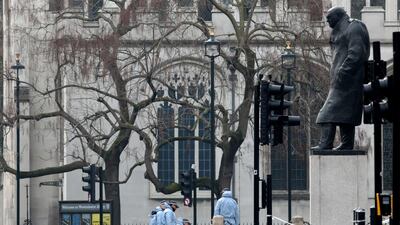The man who killed four people round the British parliament was named as British-born 52-year-old Khalid Masood, claimed by ISIL as a “soldier”.
He was born in Kent, a mostly affluent part of south-east England, but police believe he had most recently been living in the Birmingham area in central England. He was married with a young child.
Masood was also known by several aliases and had previously been investigated by British intelligence as a “peripheral figure”. But although he had numerous convictions for assault, possession of offensive weapons and public order offences, police said there was prior intelligence to indicate he was planning a terrorist attack.
He acquired his first criminal conviction in November 1983 for criminal damage. His most recent was in December 2003 for possession of a knife.
Prime minister Theresa May told parliament on Thursday that the assailant who killed four people and injured 40 more was “inspired by Islamist ideology” and had been investigated in the past for possible links to extremist violence.
“He was a peripheral figure. The case is historic. He was not part of the current intelligence picture. There was no prior intelligence of his intent or of the plot,” she said.
Addressing the House of Commons, the lower house of the British parliament, on the morning after the attack, a sombre Mrs May said the attempt to “silence our democracy” had failed. Shortly after her speech, the ISIL propaganda arm, Amaq, claimed responsibility for the attack – the first time the extremists have claimed an attack on British soil – calling the assailant “a soldier of the Islamic State”.
Overnight, British police arrested eight people and raided six addresses, mainly in Birmingham.
Masood killed four people, first driving his black Hyundai i40 car into pedestrians on Westminster Bridge and then stabbing to death Keith Palmer, an unarmed police constable on duty at the gates of the Palace of Wesminster, before he was himself shot dead by other police officers.
The 40 people left injured as he mowed them down were from 11 countries, Mrs May said. At least 40 people were injured as the attacker tried to plough into the crowd of pedestrians on the bridge. These included three French children, a dozen Britons, and people from Romania, South Korea, Germany and Greece.
The British counter-intelligence service, MI5, keeps track of around 3,000 people in Britain who are thought to be capable of carrying out domestic terrorist acts. The top 500 on this list are the focus of active investigations. However, Masood was not even on the longer list of 3,000.
There is “no reason to believe” that further attacks are planned, Mrs May said.
At least two of the addresses raided by police through the night and into the early hours of Thursday were in Birmingham, where a fifth of the 1.1-million-strong population is Muslim. The Hyundai car Masood drove was also rented from the a Birmingham branch office of the Enterprise car hire company. An employee recognised the vehicle from its number plate while watching the news on television.
Iwona Romek, a factory worker, also recognised Masood when she was shown a photograph of him on a stretcher. She knew he was married to an Asian woman and had a young child and lived on the same housing estate in the Winson Green area but said the family moved away some months ago.
“They were a very nice family, very reserved,” said Ms Romek. “He was very calm. I used to see him outside doing his garden – never any trouble.”
Italian Olympic boxer Vincenzo Mangiacapre on Thursday described how he was touring the grounds after an event at the Houses of Parliament when he spotted the man now named as Khalid Masood attacking PC Keith Palmer with a knife in each hand.
“He gave him around 10 stabs in the back, then he left the policeman and came toward us,” the 2012 Olympic light welterweight bronze medallist said. “I was petrified looking into the eyes of this person thinking what a human mind could do.”
A plain clothes police officer dressed in a suit, pulled out a gun and yelled for the attacker, who was running toward parliament, to stop. Boxing coach Olympic gold medallist Maurizio Stecca said the attacker kept running and was shot several times. The stabbed policeman tried to crawl to safety but collapsed. Tony Davis, a British boxing coach who was at the same event was among the first to give first aid to the fallen policeman. Mr Davis who also served with the military said, “Instinct kicked in. I leapt over the fence because that guy needed assistance. The police were holding their ground and that is when poor Keith got attacked.”
Minutes later Mr Davis was joined by Tobias Ellwood, a member of parliament and also ex-military, who took over giving CPR.
Masood’s method in London bore many similarities with the attack last July in Nice and in December in Berlin. All involved a vehicle driven at speed into densely-crowded areas. ISIL claimed those attacks too.
Within six hours, an online fund-raising page set up for Mr Palmer’s family had received more than 100,000 pounds in donations.
The Muslim Council of Britain was quick to condemn the attack, first on Wednesday evening and then again on Thursday.
Harun Khan, the council’s secretary general, said. “There is no justification for this act whatsoever. The best response to this outrage is to make sure we come together in solidarity and not allow the terrorists to divide us. I hope my Muslim brothers and sisters will reach out to fellow Londoners and Britons in solidarity to demonstrate that such hatred will not defeat our way of life.”
SSubramanian@thenational.ae

